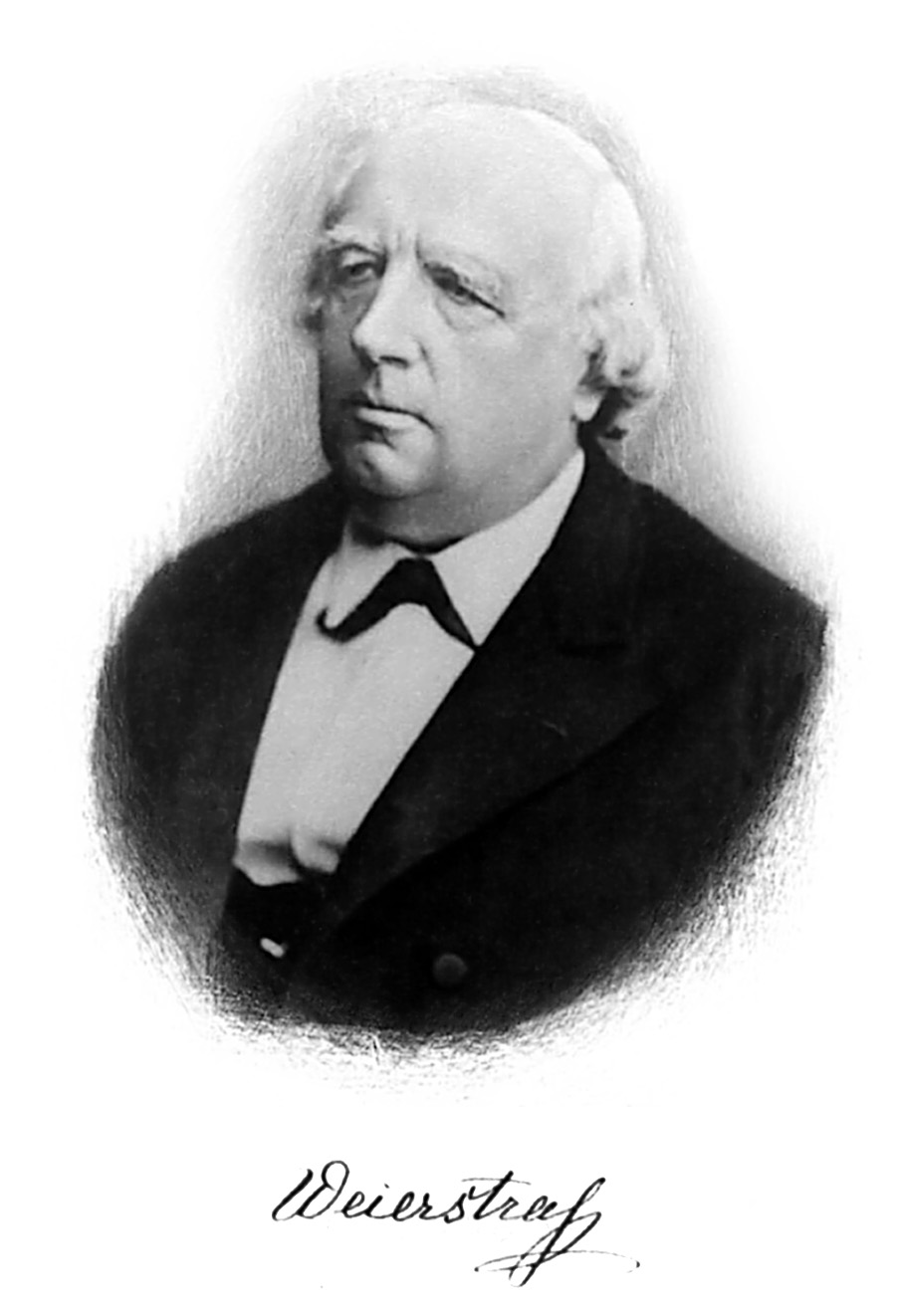- Karl Weierstrass
Infobox_Scientist
name = Karl Weierstrass

|300px
caption = Karl Theodor Wilhelm Weierstrass (Weierstraß)
birth_date = birth date|1815|10|31|mf=y
birth_place = Ostenfelde,Westphalia
death_date = death date and age|1897|2|19|1815|10|31|mf=y
death_place =Berlin ,Germany
residence =
nationality =
field =Mathematician
work_institution = Gewerbeinstitut
alma_mater =University of Bonn Münster Academy
doctoral_advisor =Christoph Gudermann
doctoral_students =Georg Cantor Georg Frobenius Lazarus Fuchs Wilhelm Killing Leo Königsberger Sofia Kovalevskaya
Mathias (Matyas) LerchHans von Mangoldt Richard Müller Carl Runge Arthur Schoenflies Friedrich Schottky Hermann Schwarz
known_for =Weierstrass function
prizes =
religion =
footnotes =Karl Theodor Wilhelm Weierstrass (Weierstraß) (
October 31 ,1815 –February 19 ,1897 ) was a German mathematician who is often cited as the "father of modern analysis".Biography
Weierstrass was born in Ostenfelde, part of
Ennigerloh ,Province of Westphalia .Weierstrass was the son of Wilhelm Weierstrass, a government official, and Theodora Vonderforst. His interest in mathematics began while he was a "Gymnasium" student, and was sent to the
University of Bonn upon graduation to prepare for a government position. Because his studies were to be in the fields oflaw , economics, and finance, he was immediately in conflict with his hopes to study mathematics. He resolved the conflict by paying little heed to his planned course of study, but continued private study in mathematics. The outcome was leaving the university without a degree. After that he studied mathematics at theUniversity of Münster which was even to this time very famous for mathematics and his father was able to obtain a place for him in a teacher training school inMünster , and he later was certified as a teacher in that city. During this period of study, Weierstrass attended the lectures ofChristoph Gudermann and became interested inelliptic function s.After 1850 Weierstrass suffered from a long period of illness, but was able to publish papers that brought him fame and distinction. He took a chair at the
Technical University of Berlin , then known as the Gewerbeinstitut. He was immobile for the last three years of his life, and died in Berlin frompneumonia .Mathematical contributions
Soundness of calculus
Weierstrass was interested in the soundness of calculus. At the time, there were ambiguous definitions regarding the fundamentals of calculus, hence theorems could not be properly proven. While Bolzano had developed a reasonably rigorous definition of a limit as early as 1817 (and possibly even earlier) his work remained unknown to most of the mathematical community until years later, and other eminent mathematicians such as Cauchy had only vague definitions of limits and continuity of functions. Weierstrass defined continuity as follows:
is continuous at if for every such that:
Weierstrass also formulated similar (ε, δ)-definitions of limit and
derivative still taught today.With these new definitions he was able to write proofs of several then-unproven theorems such as the
intermediate value theorem ,Bolzano-Weierstrass theorem , andHeine-Borel theorem .Calculus of variations
Weierstrass also made significant advancements in the field of
calculus of variations . Using the apparatus of analysis that he helped to develop, Weierstrass was able to give a complete reformulation of the theory which gave way for the modern study of calculus of variations. Among several significant results, Weierstrass established a necessary condition for the existence ofstrong extrema of variational problems. He also helped devise theWeierstrass-Erdmann corner conditions which give sufficient conditions for an extremal to have a corner.Other analytical theorems
*
Stone-Weierstrass theorem
*Weierstrass-Casorati theorem
*Weierstrass's elliptic functions
*Weierstrass function
*Weierstrass M-test
*Weierstrass preparation theorem
*Lindemann-Weierstrass theorem
*Weierstrass factorization theorem
*Enneper-Weierstrass parameterization
*Sokhatsky-Weierstrass theorem Selected works
*"Zur Theorie der Abelschen Functionen" (1854)
*"Theorie der Abelschen Functionen" (1856)
* " [http://name.umdl.umich.edu/AAN8481.0001.001 Abhandlungen-1] "// Math. Werke. Bd. 1. Berlin, 1894
* " [http://name.umdl.umich.edu/AAN8481.0002.001 Abhandlungen-2] "// Math. Werke. Bd. 2. Berlin, 1897
* " [http://name.umdl.umich.edu/AAN8481.0003.001 Abhandlungen-3] "// Math. Werke. Bd. 3. Berlin, 1915
* " [http://name.umdl.umich.edu/AAN8481.0004.001 Vorl. ueber die Theorie der Abelschen Transcendenten] "// Math. Werke. Bd. 4. Berlin, 1902
* " [http://name.umdl.umich.edu/AAN8481.0007.001 Vorl. ueber Variationsrechnung] "// Math. Werke. Bd. 6. Berlin, 1927tudents of Karl Weierstrass
*
Edmund Husserl
*Sofia Kovalevskaya
*Gösta Mittag-Leffler
*Hermann Schwarz Honours and awards
The
crater Weierstrass is named after him.External links
*MacTutor Biography|id=Weierstrass
*MathGenealogy |id=7486
* [http://bibliothek.bbaw.de/bibliothek-digital/digitalequellen/schriften/autoren/weierstr/ Digitalized versions of Weierstraß' original publications] are freely available online from the library of the " [http://bibliothek.bbaw.de/bibliothek-digital Berlin Brandenburgische Akademie der Wissenschaften] ".Persondata
NAME= Weierstrass, Karl
ALTERNATIVE NAMES=
SHORT DESCRIPTION=Mathematician
DATE OF BIRTH=October 31 ,1815
PLACE OF BIRTH=Ostenfelde ,Westphalia
DATE OF DEATH=February 19 ,1897
PLACE OF DEATH=Berlin ,Germany
Wikimedia Foundation. 2010.
